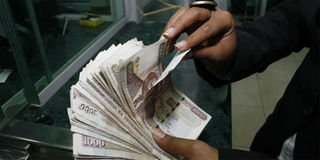Like Zambia, State taxes all it can, spends with wild abandon

I recently read somewhere that, in Zambia, the government has become quite hungry for money and that — like us — the administration in Lusaka has resorted to introducing all manner of taxes. PHOTO | FILE | NATION MEDIA GROUP
What you need to know:
- Here, the government has just introduced taxes on essentials, including VAT on petroleum products and agro-chemicals.
- Clearly, the economic conditions and situation in Zambia mirror what is happening in our country in many ways.
- As in Zambia, the loans go directly to the Chinese contractors.
I recently read somewhere that, in Zambia, the government has become quite hungry for money and that — like us — the administration in Lusaka has resorted to introducing all manner of taxes.
The Zambian government has introduced taxes on boreholes, internet calls and even weather reports.
I found myself comparing the Zambian situation with the trends and prevailing conditions.
Here, the government has just introduced taxes on essentials, including VAT on petroleum products and agro-chemicals, excise duty on mobile money transfers and bank charges and duty on inter-bank transfers.
MODERN TAXES
In the name of introducing modern taxes and reducing reliance on traditional taxes such as income tax, sales tax and customs duty, we are now in a situation where the taxman will catch you at the ATM, nail you when you make an over-the-counter withdrawal at your bank and even grab a pound of flesh from you as you make that urgent call on your mobile telephone to your mother in the village.
It will raid your pocket as you browse at an internet café and nail you as you watch your favourite football team play a match in the comfort of your living room on SuperSport, GOtv or Safaricom Data.
It used to be the case that ‘sin taxes’ — mainly excise duties — were mostly imposed on socially prescribed goods and services such as alcohol, hard liquor, cigarettes, beer and other forms of goods of ostentation. Sin taxes are supposed to control anti-social behaviour. Today, the logic has been made to stand on its head.
Which is why I ask: What sin have I committed? Where is the anti-social behaviour when all I do is to send money to my sick mother in the village by M-Pesa? Is it not incredible that, over and above what we pay in VAT on talk-time and mobile money transfers, we still have to pay excise duty on what has become an essential service that is consumed by millions of people?
Which brings me back to the report which I read on Zambia.
I drew many parallels between the economic situation in Lusaka and what I see here.
ENGAGED IN A SPLURGE
I read that the government there has, in the past few years, been engaged in a splurge on new roads, hospital, railways, airports — all funded by the Chinese — and expanded the number of administrative districts from 72 to 115, in the process doubling the civil service wage bill in just a few years.
Here, we created 47 counties and the Senate, expanded the National Assembly and introduced many new constitutional commissions.
Like Zambia, the Kenyan government has been on a spending spree — building roads, the SGR, power transmission networks, rural electrification schemes and dams, all mainly funded by the Chinese.
In Zambia, debt has rapidly accumulated with 50 per cent of it denominated in foreign currency. We are more or less in the same situation, where half of our debt is also external and mainly owed to Chinese and the Western institutions who invested in the Eurobond.
Zambia has issued three Eurobonds — $750 million in 2012, $1 billion in 2014 and $ 1.25 billion in 2015. Debt repayment is putting enormous pressure on government finances. While the largest budget expenditure item of the government in the past used to be education, today it is debt repayment.
In Kenya, we have issued two Eurobonds — $ 2.75 million in 2014 and $2 billion in 2018. Our debt servicing budget is huge with repayments with interest eating up over 20 per cent of national revenues.
Just as the case here, long delays in payment of contractors by the Zambian government has caused massive pending bills. Also like here, pressures caused by large arrears to the private sector have precipitated an upsurge of non-performing loans in the banking system.
DOMINATE PROJECTS
Again, as is the case in Kenya, the Chinese dominate financing and the building of mega infrastructure projects in Zambia. Typically, loans and opaque deals are agreed with government agencies and Export-Import Bank of China (Exim), which lends to Chinese contractors directly.
Here, loans and opaque deals typically start with the signing of MoUs with Cabinet secretaries, followed by the sealing of financing deals with Exim Bank.
As in Zambia, the loans go directly to the Chinese contractors.
Clearly, the economic conditions and situation in Zambia mirror what is happening in our country in many ways.
Zambia is among the 18 African countries that the International Monetary Fund (IMF) has fingered as being in a situation that the Bretton Woods institution categorised as at risk of being in debt distress.
We are surely headed there.




